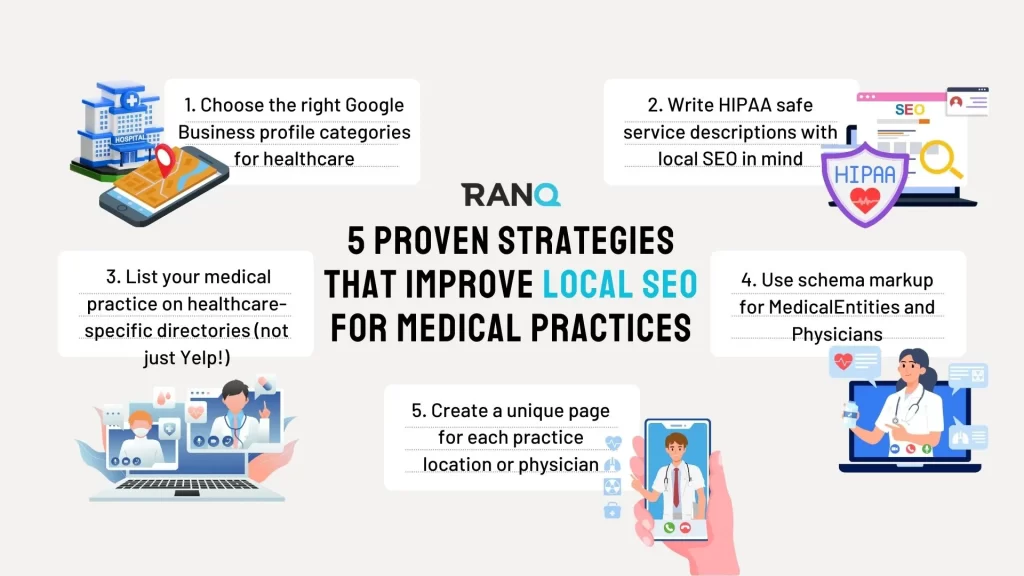Last updated on August 13th, 2025
As a clinic manager, you’ve seen the stiff competition in the healthcare industry and how local online visibility is critical for your continued success. How to achieve that visibility is a different question that you’ve maybe had mixed success with.
In this blog, we’ll discuss how, by implementing these proven medical local SEO strategies, you can help your practice or clinic appear more frequently in local searches, attract new patients, and build cumulative trust with your new and existing patient base.
Should medical practices focus more on local or general SEO?

The two primary kinds of SEO are general and local, and while general SEO can be broadly helpful for you as a provider, it’s local SEO that drives actual foot traffic and new patients. Research shows that most healthcare decisions start with a local search (e.g. “urgent care near me” or “dentist in Portland”), and that search engines like Google prioritize location-based results in healthcare, especially on mobile devices.
Google’s local search algorithm hinges on three factors – proximity, relevance, and prominence – so a clinic in Austin won’t rank for someone searching in Dallas. And that’s a good thing for your business as Google will redirect the patient back to you as a provider within their service area. Thus, local SEO takes precedence over general SEO practices in this case.
Why local SEO for doctors comes with unique challenges
Compared to other industries, local SEO for medical practices faces unique challenges. A few of these factors include:
- HIPAA Compliance – Clinics cannot take advantage of reviews and patient stories for marketing purposes.
- No Marketing Team – Because there is no full marketing team, the office manager is responsible for executing marketing initiatives.

- Healthcare Hinges on Trust – Healthcare isn’t the only industry that tries to build trust with its customer base, but it’s one of the few where it’s fundamental.
- Algorithms and Patient Behavior Change – Unlike some industries, healthcare is not a one-and-done process. Patients’ feelings about each interaction are fluid and can change based on internal and external circumstances that can’t be predicted. This is why practices will often outsource SEO services to experts.
5 Proven strategies that improve local SEO for medical practices

In the next section, we’ll discuss five proven strategies to improve local SEO for medical practices like yours.
1. Choose the right Google Business profile categories for healthcare
The specifics and categorization of your Google Business Profile can determine whether your prospective patients will even consider you as a provider. Many patients will never even visit your website – they’ll find you and book through your Google Business Profile. Here are a few critical steps to follow when optimizing your GBP.
- Confirm and verify your GBP listing.
- Choose the right primary category for you as a provider. Medical practices have industry-specific categories like “Urgent Care Center, Family Practice Physician, OBGYN Clinic, and Mental Health Service.”
- Add secondary categories for even broader service visibility (e.g. if you’re a primary care clinic that also offers urgent care services.). Through accurate categorization, you’re helping Google match a searcher’s intent with service offerings that include your provider.
- Compare your chosen categorizations with your local competitors, and add secondary categories that emphasize your uniqueness.
2. Write HIPAA safe service descriptions with medical local SEO in mind
Within the rules of HIPAA compliance, adjust your service pages (e.g. “Allergy Testing” or “pediatric care”) so they’re written using local SEO best practices. Here are a few guidelines:
- Include natural, geo-specific phrases in your service section (e.g. “Our pediatric clinic in North Austin offers same-day care for families)
- Part of HIPAA compliance is to never include patient names, case outcomes, or specific protected health details. Testimonials that suggest a diagnosis or treatment should also be avoided unless the patient is anonymous.
- Avoid negative SEO tactics like keyword stuffing (bunching together unnatural words or phrases to manipulate visibility). Your copy should sound natural, trustworthy, and informative.
- When trying to discern what patients in your area are searching for, use tools like Google Trends or “People Also Ask,” and incorporate that language in your copy.
3. List your medical practice on healthcare-specific directories (not just Yelp!)
When listing a healthcare provider on online directories, places like Yelp and Facebook can be helpful but healthcare-specific directories carry more SEO weight and credibility for the healthcare industry. Here are some things to keep in mind:
- Prioritize accurate listings on healthcare-specific websites like:
- WebMD – the gold standard of medical info and finding providers for potential patients.
- Healthgrades – A platform that provides info and ratings for hospitals and healthcare providers
- Zocdoc – Platform to find and book in-person and telemedicine appointments.
- Vitals – Another platform with a directory to book providers.

- Google uses these directory listings to validate business information. An error could be something like your clinic being listed as “WellCare Clinic” on Google, but listed as “Well Care Center” on Healthgrades.
- Check to see if there are duplicate listings or outdated info on these sites and your own site. This is especially relevant for providers who have moved offices.
- Tools like BrightLocal or Moz Local can be used to automate cleanup of these listings and track if there are issues.
4. Use schema markup for MedicalEntities and Physicians
When making your clinic’s website, you should add schema markup. Schema markup is code that tells search engines what type of content is available on your page (e.g. a medical organization, a physician, services). Here are some things to know about schema:
- For healthcare, there are three types of schema to know
- MedicalOrganization
- MedicalClinic
- Physician
- MedicalOrganization
- MedicalClinic
- Physician
- Adding specific schema to each page can help search engines display details like ratings, hours, or accepted insurance, which can increase click-through rates and local pack visibility.
- Google’s Structured Data Markup Helper can help generate the right code for each page.
- Remember that the schema should be updated if the doctor’s name, office location, or general availability changes. Developers and SEO experts can also apply this schema markup throughout your site.
5. Create a unique page for each practice location or physician
When creating pages for your practice’s site, create a unique page with keywords for each practice location or physician. This is beneficial not only for local medical SEO but for patients.
Here are some prerequisites for location and provider pages:
- Each location page on your website should include:
- NAP info (name, address, phone). You can also put location-specific keywords in your landing page’s content, metadata, and URLs to increase visibility.
- Clinic location hours
- Embedded Google Map of location
- Neighborhood landmarks or parking info (to build local context)
- Services offered at that location
- NAP info (name, address, phone). You can also put location-specific keywords in your landing page’s content, metadata, and URLs to increase visibility.
- Each provider page on your website should include:
- Provider’s name and credentials
- Specialties and areas of focus
- Practice location(s)
- Bio and headshot (optional, but helpful to build trust)
- A CTA (Call-to-action) to book an appointment
- Provider’s name and credentials
When you create these pages, avoid duplicating content. Copying the same text for every provider or location page will dilute its SEO value. And since these pages are often what Google shows in the local pack, these pages need to be optimized just like landing pages.
Strong local SEO for medical practices means more patients and less guesswork!
When your patients are actively seeking care, local SEO for medical practices can determine whether you appear in the proper search results at the right time. Local SEO for medical services isn’t a one-size-fits-all procedure. It requires accuracy about your services, compliance with the law, and the content that will build trust with your patients.
It’s reasonable if you don’t have the time or expertise to stay on top of the required technical SEO additions, citation updates, and content additions that will maintain your visibility and credibility within the healthcare community. The digital marketing pros at Ranq can offer robust keyword research, tactically targeted blog content, and regular upgrades that can improve your site speed, local SEO optimization, and your Core Web Vitals.


